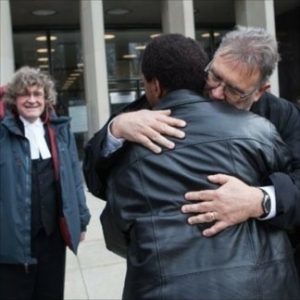Leighton Hay, an innocent man, spent 12-plus years in jail for murder, wronged by the ‘justice’ system, and was eventually freed only because of a close shave.
Man freed by close shave, 12 years late
If you shave, keep the clippings.
That’s one lesson from a Canadian case where a man has just been released from prison after serving 12 1/2 years for a murder he did not commit.
Leighton Hay was released in the Superior Court of Justice in Toronto in November 2014 by Justice J. McMahon after the Canadian government terminated any further chance of his prosecution. Some would say “persecution”.

AIDWYC pro bono lawyers, Phil Campbell, immediately
after the Nov 2014 court hearing.
(Jesse Johnston photo)
Hay was arrested in July 2002. Two men had stormed a nightclub armed with handguns, They killed a man. One of the gunmen, Gary Eunick, was recognised, and an eyewitness got the number plate of his car. Eunick had borrowed the car belonging to Leighton Hay’s mother.
The next morning, at the Hay home, police arrested Eunick…and Hay.
Witnesses at the nightclub described the second gunman as having “two-inch picky dreads”. But Hay, when arrested, had extremely short hair. Police devised a theory (an ‘overcom-ism’, common to police argument in many controversial cases) that Hay had shaved his head overnight, and emerged shorn as a “disguise”.
Police scoured the Hay home, and found very short hairs in a newspaper in a garbage bin, and on an electric razor in his bedroom. At his trial in 2004, the Crown told the jury the hairs must have been the residue left behind after Hay had cut dreadlocks, and flushed most of his hair down the toilet. A jury convicted Leighton Hay (and Gary Eunick).
In May 2009, the Ontario Court of Appeal dismissed Leighton Hay’s appeal, saying the claimed haircut “tipped the scales” in support of the jury verdict. Once again, a superior court had deferred to jury stupidity, a common happening in miscarriages of justice.
The Association In Defence of the WrongfullY Convicted (AIDWYC), a Toronto-based Canadian ‘innocence” organisation, took up Hay’s case. They wanted the hair remnants found in the home scientifically tested to see if they came from the supposed haircut. The Crown objected. AIDWYC had to take the case to the Supreme Court of Canada just to get permission for the Centre For Forensic Sciences to do the testing.
Joanne Almer, working under the centre’s director Tony Tessarolo – and observed by two outside experts, one for the Crown and one for Hay – found that the hairs held by the police were from a facial shave “to a reasonable degree of scientific certainty”, and were not from a haircut.
In November 2013, the Supreme Court of Canada quashed Hay’s conviction and ordered a new trial.
For a year, the Crown sat on whether it would proceed to a new trial. Finally, on Friday 28 November 2014, a year after Hay should have been released, and more than 12 years after Canada locked up an innocent man, he was able to walk free.
Postscript:
On Monday of the same week, in Halifax, Nova Scotia, AIDWYC counsel secured the release of Glen Assoun, after he had spent 17 years in jail for a murder he did not commit. Mr Assoun has filed an application with the Minister of Justice to quash his 1999 conviction for second degree murder.
On Tuesday of the same week, in Winnipeg, Manitoba, AIDWYC counsel secured a ministerial reference to the Manitoba Court of Appeal for Frank Ostrowski, wrongly convicted in 1986 of first degree murder. AIDWYC had secured Mr Ostrowski’s release on bail during a ministerial review in 2009 after he had spent 23 years in prison.
Injustice is like a virus, it continues to spread. Civil Liberties Australia is campaigning for ‘Better Justice’ for all communities.


The Crown objected to the hair remnants being forensically examined. This in a nutshell highlights one of the problems of the system: the Crown just wants a conviction, never mind if it’s the wrong one. Why object in the search for the truth?